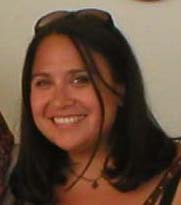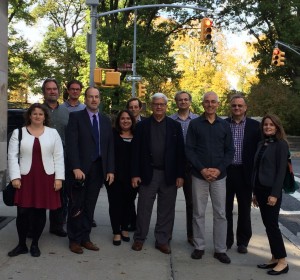 The Sixth Plenary Meeting of the Research Data Alliance was held last week (23-25 September 2015) at CNAM, the Conservatoire national des arts et métiers. This was the largest RDA plenary so far with roughly 700 participants.
The Sixth Plenary Meeting of the Research Data Alliance was held last week (23-25 September 2015) at CNAM, the Conservatoire national des arts et métiers. This was the largest RDA plenary so far with roughly 700 participants.
 A highlight for me was Barbara Ryan’s keynote and the impromptu and well-informed talk given by the French Minister of State for Digital Affaires, Axelle Lemaire.
A highlight for me was Barbara Ryan’s keynote and the impromptu and well-informed talk given by the French Minister of State for Digital Affaires, Axelle Lemaire.
This was a somewhat different Plenary for me than previous ones. RDA Plenaries have a chaotic, ‘unconference’ feel, with a lot of ‘Birds of a Feather’ sessions to collect together interested parties and Interest Groups working out their activities, as well as Working Groups reporting on their progress. It is an exciting model, with huge potential, but it also requires perseverance and patience; for people both to stand up for their ideas and to be willing to collaborate and compromise. These are good things, of course. Watching them evolve is fulfilling, fascinating and frustrating in equal measure, as it must be.
 This year was different because I am heavily involved in three very active and productive Groups and I had to focus on these and other meetings, at the expense of engaging with BOFs and other TGs or WGs. I’m sure the cycle will swing round again, but this was a Plenary to be more focused and productive.
This year was different because I am heavily involved in three very active and productive Groups and I had to focus on these and other meetings, at the expense of engaging with BOFs and other TGs or WGs. I’m sure the cycle will swing round again, but this was a Plenary to be more focused and productive.
The CODATA community was very actively involved and there are a number of joint Working Groups and Interest Groups. Here are the key activities:
RDA-WDS Interest Group on Cost Recovery for Data Repositories
 Along with Ingrid Dillo of DANS and the WDS Scientific Committee, and Anita de Waard of Elsevier Research, I am one of the co-chairs of this co-branded RDA-WDS Interest Group. The focus of the activity is to analyse current income streams for data repositories, to understand how they are changing and what new sources of income may be available if the repository needs to evolve its business model to ensure sustainability. In depth interviews were conducted with some 25 data repositories and the findings of those interviews have now been written up into a draft report.
Along with Ingrid Dillo of DANS and the WDS Scientific Committee, and Anita de Waard of Elsevier Research, I am one of the co-chairs of this co-branded RDA-WDS Interest Group. The focus of the activity is to analyse current income streams for data repositories, to understand how they are changing and what new sources of income may be available if the repository needs to evolve its business model to ensure sustainability. In depth interviews were conducted with some 25 data repositories and the findings of those interviews have now been written up into a draft report.
In a shared session with the RDA Interest Group on Domain Repositories, we presented the key findings of the report which include a landscape analysis of the types of income streams and a typology of the overall business models encountered. Participants of the session then conducted a SWOT analysis of these business models. The results of this will be published soon.
CODATA-RDA Interest Group on Legal Interoperability
 As Mark Parsons said in his introductory talk, the CODATA-RDA Interest Group has been cranking out the work! At the Fifth Plenary in San Diego, we presented a definition and a set of high level ‘Legal Interoperability Principles for Research Data’. Legal interoperability is an attribute which is important for the reuse of research data.
As Mark Parsons said in his introductory talk, the CODATA-RDA Interest Group has been cranking out the work! At the Fifth Plenary in San Diego, we presented a definition and a set of high level ‘Legal Interoperability Principles for Research Data’. Legal interoperability is an attribute which is important for the reuse of research data.
Legal interoperability occurs among multiple datasets when:
- use conditions are clearly and readily determinable for each of the datasets,
- the legal use conditions imposed on each dataset allow creation and use of combined or derivative products, and
- users may legally access and use each dataset without seeking authorization from data rights holders on a case-by-case basis, assuming that the accumulated conditions of use for each and all of the datasets are met.
The principles identify the primary issues to be addressed to achieve such legal interoperability. Over the last six months, the group has been developing a set of practical implementation guidelines for these principles. The crank has been turned by many hands through a regular series of online calls. The session discussed the draft document and laid out our schedule to deliver a completed set of Implementation Guidelines for the Principles on the Legal Interoperability of Research Data
CODATA-RDA Working Group on Data Science Summer Schools
This activity starts from the premise that contemporary research – particularly when addressing the most significant, transdisciplinary research challenges – cannot be done effectively without a range of skills relating to data. This includes the principles and practice of Open Science and research data management and curation, the use of a range of data platforms and infrastructures, large scale analysis, statistics, visualisation and modelling techniques, software development and annotation and more. We define ‘Research Data Science’ as the ensemble of these skills.
The CODATA-RDA Working Group on Data Science Summer Schools aims to address this recognised need for a means to develop additional skills through a scalable and consistent series of short courses or ‘Summer Schools’. The model builds on existing CODATA activities, and brings together partners and with expertise and reusable materials to create a coherent whole that is more than the sum of its parts. The partners include Software Carpentry, Data Carpentry and the Digital Curation Centre.
 The first introductory Research Data Science Summer School will be hosted by the International Centre of Theoretical Physics, in Trieste, Italy, 1-12 August 2016. The ICTP is generously providing accommodation and board for up to 120 participants. Travel funding for 30-40 students has been secured from ICTP, TWAS and CODATA and discussions are ongoing with other sponsors and funders.
The first introductory Research Data Science Summer School will be hosted by the International Centre of Theoretical Physics, in Trieste, Italy, 1-12 August 2016. The ICTP is generously providing accommodation and board for up to 120 participants. Travel funding for 30-40 students has been secured from ICTP, TWAS and CODATA and discussions are ongoing with other sponsors and funders.
The session discussed the approach and included a call for further collaborators and funding.
In addition to these three Groups, with which I am directly involved as co-chair or facilitator, there were three other activities with connections to CODATA Task Groups.
CODATA DAR TG-RDA Data Rescue IG
The CODATA DAR TG-RDA Data Rescue IG held a joint session, entitled ‘The Data Corridor: You, The Past, and The Future’.
From the session description:
 The RDA/CODATA Data Rescue Group plans to publish a book on “Data Rescue”. It will set the scene, describe and expand the rationale, define the benchmarks, and present selected Case Studies. Which Case Studies to include can be a topic for open discussion at this session. An added intention is that a (possibly annual) Newsletter (online) will be issued to update the Case Studies and report new ones.
The RDA/CODATA Data Rescue Group plans to publish a book on “Data Rescue”. It will set the scene, describe and expand the rationale, define the benchmarks, and present selected Case Studies. Which Case Studies to include can be a topic for open discussion at this session. An added intention is that a (possibly annual) Newsletter (online) will be issued to update the Case Studies and report new ones.
The RDA/CODATA Data Rescue Group has also been charged with presenting “Guidelines” for rescuing data. Activities involved in the recovery, digitizing, preserving of originals, plus the dissemination and archiving of the digitial versions, all need to be included in those Guidelines. The Group will hold a Workshop on Data Rescue in Boulder in the Fall of 2016, where topics for the Guidelines will also be addressed. However, the Workshop will probably appeal more to data producers while the RDA community tends to include more data managers. This session will therefore seek input from aspects of data management regarding contributions to those Guidelines.
CODATA TG on Science and the Management of Physical Objects in the Digital Era
The CODATA TG on Science and the Management of Physical Objects in the Digital Era held a ‘Birds of a Feather Session’ on ‘Persistently Linking Physical Samples with Data and Publications: A Matter of Reproducible Research’ with a view to establishing an RDA Interest Group. The objectives of the BOF were:
- To identify as many systems, both domain specific and cross domain, that are being developed to manage physical objects and data and publications derived from them.
- To facilitate international cooperation to develop harmonized approaches and best practices for physical object identification and digital curation.
- To build linkages between object repositories and museums, digital data repositories, scientific publications, and science communities.
- To enable the facilitation of object and sample identification infrastructure both at the national and international levels.
CODATA-RDA Interest Group on Materials Data, Infrastructure & Interoperability
Last but not least, the CODATA-RDA Materials Data, Infrastructure and Interoperability Interest Group, held a session to establish a Working Group on the International Materials Resource Registry (IMMR).































